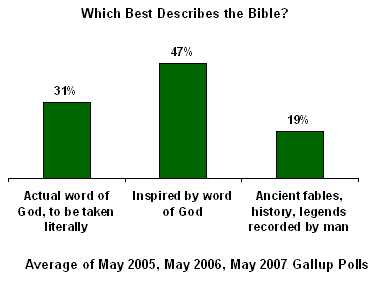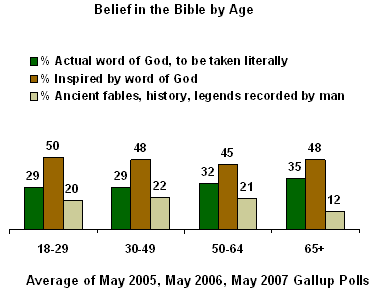Is the Bible Literally True?

I came across this little tidbit while reading the Ft. Worth Star-Telegram. I looked up the poll on Gallup's site. You can click the title of this post to go to the full story on Gallup's website. The difficulty with this poll in interpreting all that its results reveal is that I don't know how the questions were worded. Let me point out a few key points of the poll.
1) This survey is an average of an identical poll done in May every year. The total number of participants equals 3010.
To provide a larger and more stable sample for purposes of analyzing the distribution of beliefs regarding the Bible in the American population, we aggregated data from the last three surveys in which this Bible question was asked -- in May of 2005, 2006, and 2007 -- for a sample size of 3,010 interviews.Now, somehow, 3010 people more than speak for well over 300 million people in the United States. However, 405 Southern Baptist pastors can't speak for Southern Baptists according to someone at an SBC entity which has publicly claimed it will not be a part of the "criticism of a sister agency." I don't know how that works exactly.
2) From the Gallup Organization:
Only about one-third of Americans today believe the Bible is absolutely accurate and that it should be taken literally word for word. The rest either feel that the Bible is the inspired word of God, but not literally so, or that it is a book of ancient fables, legends, and history as recorded by man.31% held to the belief that the Bible is "absolutely accurate" and "should be taken literally word for word." I am really curious here if the wording of the questions played a part of the answers. Yet, we ought to take this at least at face value. Okay, actually the really fun question is which of the first two would represent inerrancy?
3) Again, an interesting point:
It is interesting to note, however, that 10% of those with no religious identification still believe the Bible is literally the word of God, and another 26% say it is inspired.Does it fascinate you that 36% of those with "no religious identification" held to either a literal or inspired view of the Bible?
4) Another interesting portion:
The analysis of these data shows one demographic variable that is highly related to views of the Bible -- education. The higher the level of education, the less likely the individual is to believe that the Bible is the actual, literal word of God.I don't really have any idea of what to make of this one. I would dare to theorize that those with more education would see some of the fallacies of adopting a very high literal view of Scripture. What I mean by this is that there are obvious hyperbole in the Bible. I don't know of a lot of literal ineerantists who are missing their right eye and hand. Again, this is an assumption on my part. I really don't know how the questions were worded.
5) I am really surprised at the consistency of the results over the various age groups:
There is not a highly significant relationship between age and belief in a literal Bible.
Perhaps, what this is saying, is that all those young postmodern whippersnappers, who are decried regularly as being "moral relativists", really do hold to truth. The truth they hold to is not the modernist radically logical reductionist truth. Regardless of age, the Bible is held in high esteem. Apparently the root of the arguments and accusations is found in one's application and interpretation of what that truth means.


0 Comments:
Post a Comment
Subscribe to Post Comments [Atom]
<< Home